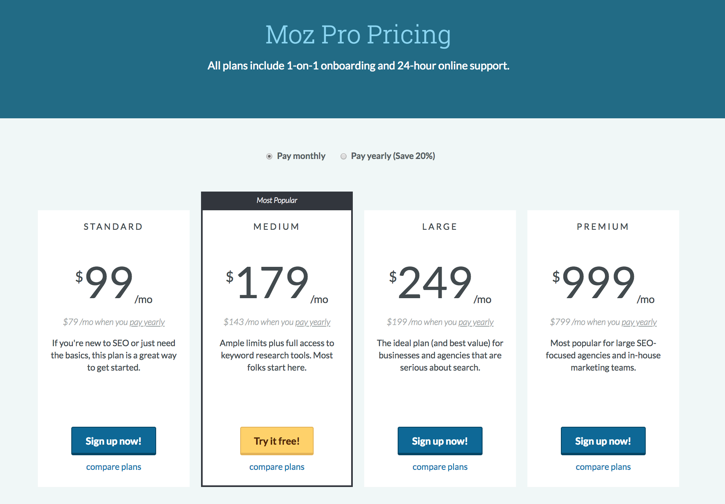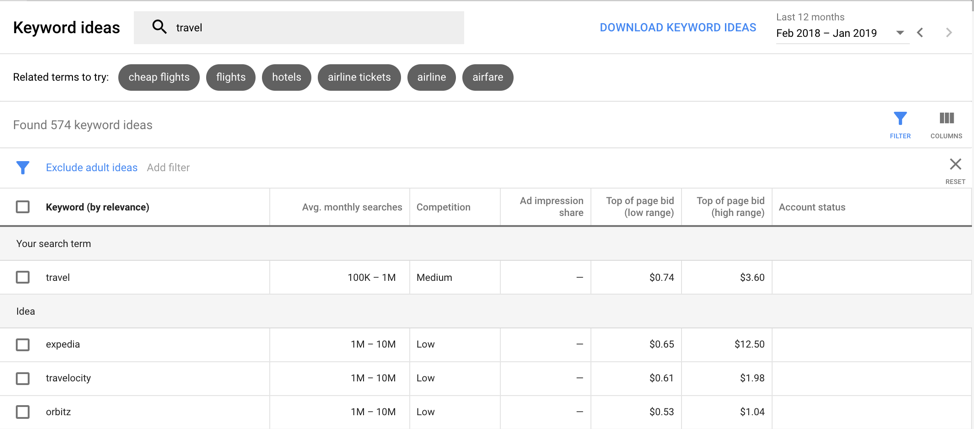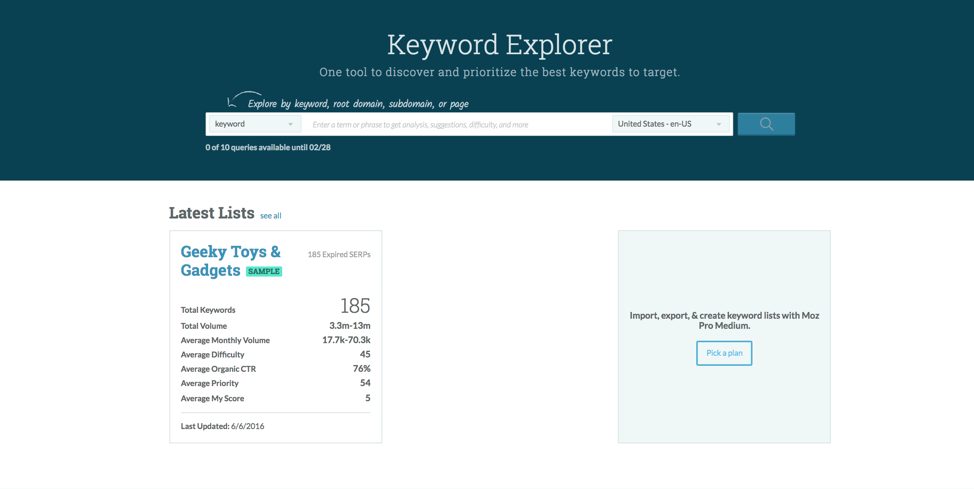Keyword research has been called the “foundation of SEO”, and for good reason. An effective keyword strategy should be the basis for driving new traffic to your website by producing optimized, relevant, valuable content for your target audience. The content attracts visitors, and visitors turn into leads. Thus, it’s no surprise that business owners are looking for the most effective keyword tool to make keyword research as seamless and as accurate as possible. There are many keyword research tools available, but 2 of the most popular are Google’s Keyword Planner (GKP) and Moz’s Keyword Explorer (MKE). Both serve the same purpose, but differ just enough to make users wonder which one they should focus their efforts on. For the sake of this article, we’ve broken down both tools according to their common features.
Price
One of the main differences between these two tools is that Google Keyword Planner is free, and Moz Keyword Explorer is not. All you have to do to use Keyword Planner is create an Adwords account, and this is free to do. However, if you decide to pay to run a Google Adwords campaign you have access to more accurate search data. So free might not always be better, in this case.
Image 1
Moz offers a wide variety of packages ranging from $99 a month to $999 per month, depending on how large your business is and how in depth you want to pursue SEO. Unfortunately this means that you have to pay a minimum of $99 a month in order to use their keyword research tool, which is substantially more expensive than what Google charges. This could be a limiting factor for those who are just starting out in SEO, or for small businesses who don’t have a budget for this type of research.
Search Volume Results
Google Keyword Planner gives 7 categories of search volume results:
0–10, 10–100, 100–1000, 1000–10000, 10000–100k, 100k–1MM and 1MM+
Because these ranges are so large, they could be up to 90% off. That’s not good, considering you want your keyword data to be as accurate as possible. However, the ranges are more specific and narrow if you have an active AdWords campaign running. That being said, it costs money to run an Adwords campaign, so it negates the benefit of Keyword Planner being free.
Image 2
Moz’s Keyword Explorer is slightly more precise- they also give ranges, but they’re not as vast. Thus, their search volume predictions are more accurate. You’ll be able to make better decisions because your data will be more accurate.
Competition Metrics
When you type a keyword into GKP, Google provides a list of related keywords, their search volume, and 3 levels of competition: low, medium, and high. This is extremely helpful if you’re choosing keywords based off of your competition, which many business owners are. Chances are if you choose keywords with a high search volume and low to medium competition, your content will be successful.
Moz also provides data on competition, but instead of providing it during the initial word search, they require you to add the keyword to your list before they’ll show you competition stats. This means that you have to choose a list of desirable keywords first before knowing how they rank in terms of competition. This could potentially cause a lot of back and forth and wasted time if you’re constantly adding and removing words from your final list.
Categories of Keywords
There are 4 main types of buyer keywords: commercial, informational, navigational, and transactional. You can read more about what each type entails here. After running some extensive tests, Brittany Muller, Moz employee and author of this post, concluded that GKP better identifies commercial and informational queries, while MKE is better at finding informational and navigational queries. In addition, Moz is better at finding long tail keyword opportunities.
Image 3
Search Filters
Moz has a much more extensive list of options for keyword filters, such as: “exclude your query terms to get broader ideas” and “based on broadly related topics and synonyms”. They also have an “are questions” filter that can be really valuable, especially for long tail keyword question searches and FAQ pages.
Although Google does offer some filters, they’re nowhere near as thorough as Moz. Thus, the quality of keywords that Moz produces are overall better than GKP.
Geographic Reach
GKP comes out ahead in this category because they offer customized targeting. This means you can target search data from pretty much any city in any country. You can get really specific about the area in which you want to search. This is great news for international businesses as well as local, service-based businesses.
Moz is only available in English and only tracks searches in the US, so global brands are out of luck.
The Takeaway
In the end, two is better than one. All keyword tools are going to give you variations of information, so we think it’s better to use a combination of tools rather than sticking with one in particular. Brittany Mueller, dedicated Moz employee and the author of this post, even admits that she uses both tools when doing keyword research. Moz Keyword Explorer is great for viewing the big picture of a keyword landscape, whereas Google Keyword Planner offers a much more refined and specific view. And because one is free and one is paid, it shouldn’t impact your budget too much to utilize both!
Overall, the search volume data associated with GKP is limited, but they provide competition metrics for each keyword which is extremely valuable for SEO. Their keywords mostly fall into the categories of commercial and informational keyword types.
Moz’s search volume data is more accurate than GKP, but they lack the competition data. However, they have more filters to provide a wider range of keyword opportunities, especially for long tail keywords. Most of their words fall into the categories of: informational, navigational, or commercial investigation.
Bonus- Moz allows you to export your keyword lists to other platforms, including GKP. So it’s easy to start your search with them and then hop on over to get a second opinion with Google. It’s as if they want you to succeed…what’s not to like about that?
Do you use either of these tools for your keyword research? Do you feel like one stands out more than the other? Are there any other great keyword tools that we should be looking at? We’d love to hear from you! Furthermore, if you aren’t familiar with Google Keyword Planner and want to learn more about how to best use it to improve your website’s SEO, check out this article by No Risk SEO!
Image 1: moz.com
Image 2: ads.google.com
Image 3: moz.com
Feature Image: SearchEngineLand.com




